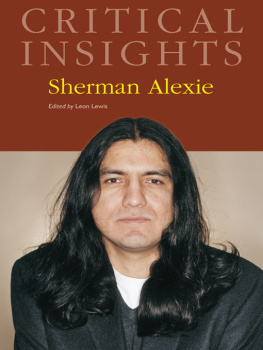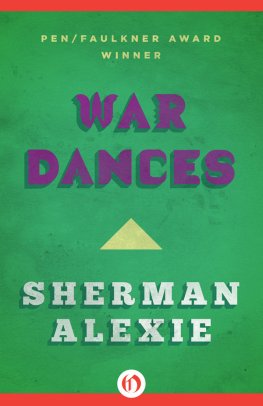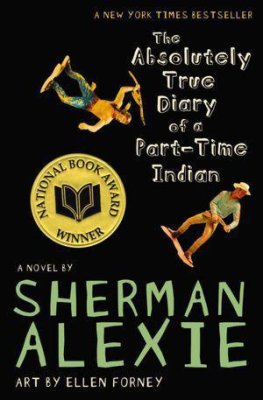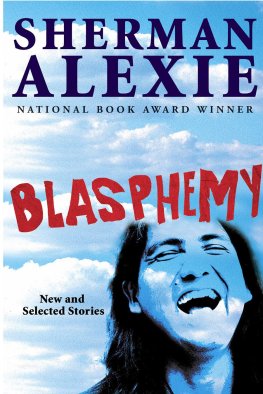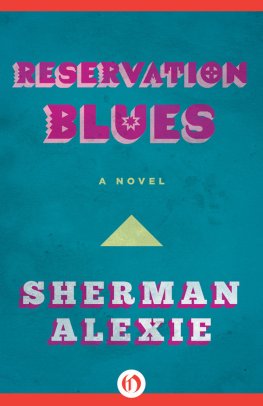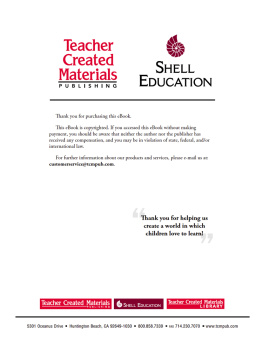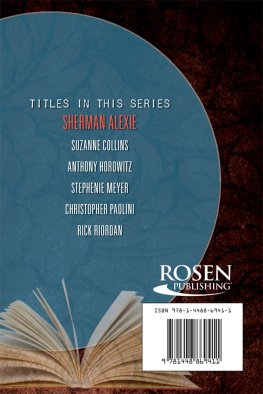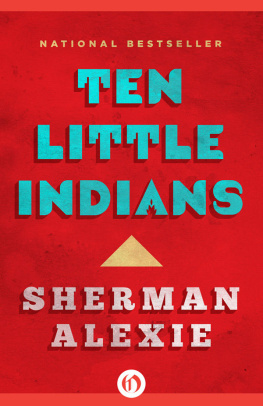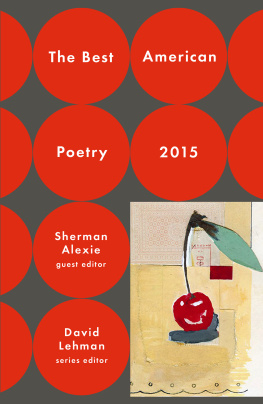Leon Lewis - Sherman Alexie (Critical Insights)
Here you can read online Leon Lewis - Sherman Alexie (Critical Insights) full text of the book (entire story) in english for free. Download pdf and epub, get meaning, cover and reviews about this ebook. year: 1707, publisher: Salem Pr, genre: Art. Description of the work, (preface) as well as reviews are available. Best literature library LitArk.com created for fans of good reading and offers a wide selection of genres:
Romance novel
Science fiction
Adventure
Detective
Science
History
Home and family
Prose
Art
Politics
Computer
Non-fiction
Religion
Business
Children
Humor
Choose a favorite category and find really read worthwhile books. Enjoy immersion in the world of imagination, feel the emotions of the characters or learn something new for yourself, make an fascinating discovery.
- Book:Sherman Alexie (Critical Insights)
- Author:
- Publisher:Salem Pr
- Genre:
- Year:1707
- Rating:3 / 5
- Favourites:Add to favourites
- Your mark:
- 60
- 1
- 2
- 3
- 4
- 5
Sherman Alexie (Critical Insights): summary, description and annotation
We offer to read an annotation, description, summary or preface (depends on what the author of the book "Sherman Alexie (Critical Insights)" wrote himself). If you haven't found the necessary information about the book — write in the comments, we will try to find it.
Sherman Alexie (Critical Insights) — read online for free the complete book (whole text) full work
Below is the text of the book, divided by pages. System saving the place of the last page read, allows you to conveniently read the book "Sherman Alexie (Critical Insights)" online for free, without having to search again every time where you left off. Put a bookmark, and you can go to the page where you finished reading at any time.
Font size:
Interval:
Bookmark:



Cover photo: Erin Patrice OBrien/CORBIS Outline
Copyright 2012 by Salem Press,
a Division of EBSCO Publishing, Inc.
Editors text 2012 by Leon Lewis
The Paris Review Perspective 2012 by Barry Harbaugh for The Paris Review
All rights in this book are reserved. No part of this work may be used or reproduced in any manner whatsoever or transmitted in any form or by any means, electronic or mechanical, including photocopy, recording, or any information storage and retrieval system, without written permission from the copyright owner except in the case of brief quotations embodied in critical articles and reviews or in the copying of images deemed to be freely licensed or in the public domain. For information address the publisher, Salem Press, at csr@salempress.com.
The paper used in these volumes conforms to the American National Standard for Permanence of Paper for Printed Library Materials, Z39.48-1992 (R1997).
Library of Congress Cataloging-in-Publication Data
Sherman Alexie / Editor, Leon Lewis.
p. cm. -- (Critical insights)
Includes bibliographical references.
ISBN 978-1-58765-821-1 (set : alk. paper) -- ISBN 978-1-58765-822-8 (set-pack A : alk. paper) -- ISBN 978-1-58765-823-5 (vol. 1 : alk. paper)
1. Alexie, Sherman, 1966---Criticism and interpretation. I. Lewis, Leon.
PS3551.L35774Z85 2012
818.5409--dc23
2011018805
PRINTED IN CANADA
Contents
Bibliography
One indication of an authors impact on the zeitgeist can be registered in terms of the extent of editions published in languages other than the one in which his or her works were written. Noticed initially as a Native American author, Sherman Alexie has achieved a reputation as a significant figure in the American literary landscape that has blossomed through the first decade of the twenty-first century as commentators have drawn Alexie into the conversation concerning writers whose work is not dependent only on a particular ethnic identity. Barry Harbaughs commentary on Alexies work in The Paris Review Perspective in this volume compares Alexies first short-story collection, The Lone Ranger and Tonto Fistfight in Heaven , to Jhumpa Lahiris Interpreter of Maladies as a seminal book of assimilation fiction, and the extent of interest in Alexies work beyond national boundaries can be measured by the proliferation of translations that are appearing and by the range of response to the work by scholars throughout the world of letters. Michel Lederers translation into French of The Lone Ranger and Tonto Fistfight in Heaven , for instance, was published as Phoenix, Arizona et autres nouvelles (from the title of the story This Is What It Means to Say Phoenix, Arizonafollowed by and other stories) in 1999. Lederers translation of The Toughest Indian in the World appeared as La Vie aux trousses (roughly life on the edge) in 2000, and Alexies collection of poetry The Summer of Black Widows was translated into Italian by Giorgio Mariani as Lestate delle vedove nere in 2005. Alexies work has also been translated into Hungarian, Hebrew, Japanese, Icelandic, and Swahili, among an expanding list of languages.
In a correlation with these editions, scholars in other countries have similarly begun to examine Alexies work. A volume titled Kulturelle Selbstentwrfe in zeitgenssocher indianischer Literatur: N. Scott Momaday, Sherman Alexie, und Wendy Rose (cultural self-projection in contemporary American Indian literature) was published in Germany in 2003. While all of the essays appearing in this volume were written in English, the diversity of the contributors reflects the transnational perspective on Alexie that has marked the response to his work, as his prominence among American writers has increased steadily to its current pinnacle of interest and engagement. A typical example is se Nygrens interview with Alexie. Nygren is a Swedish scholar whose doctoral dissertation Tracing Trauma: The Narration of Suffering in Sherman Alexies Fiction is an indication of the manner in which current modes of critical inquiry have been applied to Alexies work. Nygren, whose interview originally appeared in MELUS: Journal of the Society for the Study of Multi-Ethnic Literature of the United States , states that she approached Alexie as a European white female scholar, and her conversation with Alexie illustrates how Alexies work is illuminated by the range of references that Nygrens asute queries require.
Initial responses to Alexies writing focused on the areas of concentration that coincided with the particular points of interest that the commentators found captivating. Gloria Bird, a contributing editor at the Wicazo Sa Review and a member of the Spokane tribal grouping that includes the Wellpinit reservation, where Alexie was born, calls Alexie an enigma on the literary scene in her 1995 essay The Exaggeration of Despair in Sherman Alexies Reservation Blues , reprinted in this volume; Bird addresses a fundamental issue for Native critics when she states, This review questions the assumption that because someone is Indian what they produce is automatically an accurate representation. A continuing controvery, highlighted by Alexies refusal to be restricted to any projection of American indian reality other than his own, is given expression by the distinguished scholar Sean Kicummah Teuton when he asks, What right does Alexie have to share with general readers our most painful realities of poverty and social dysfunction? Teutons judicious exploration of this query, in the selection from his landmark Red Land, Red Power: Grounding Knowledge in the American Indian Novel included here, is an illustration of one of the most provocative and persistent issues that Alexies work has emphasized.
Proceeding past identification to a direct engagement with the issue, Tammy Wahpeconiahs new essay in this volume, Navigating the River of the World: Collective Trauma in The Absolutely True Diary of a Part-Time Indian , provides an illuminating account of a Native scholars work with her studentsthe vast maority non-Nativeand her perceived responsibility to herself, her heritage, and Alexies writing. Nancy Van Styvendales The Trans/Historicity of Trauma in Jeanette Armstrongs Slash and Sherman Alexies Indian Killer , reprinted here, widens and deepens the ways to approach this vital aspect of Native scholarship by showing that cumulative, collective, intergenerational, and intersubjective, the trauma of Native peoples, when understood as trans/historical, exceeds any attempt to fix its location or define its event, even as it demands our attention to historically specific atrocities. Van Styvendale argues that Alexies depiction of a present citation of trauma is not only-ever a repetition of the past but instead has its own materiality, its own conditions of production, its own traumatic effects, offering an explanation of how Alexies work can be regarded as a version of an accurate representation even as it differs from other persuasive portrayals, even those preferred by some respected critics.
Carrie Etters essay Dialectic to Dialogic: Negotiating Bicultural Heritage in Sherman Alexies Sonnets takes this issue into Alexies poetry, the genre acknowledged by Alexie as the original fire (to appropriate the title of Louise Erdrichs collection) that ignited his creative flame. In her discussion of the ways in which Alexie modifies the English sonnet to negotiate between his cultural inheritances, Etter stresses the ways Alexie restructures the sonnet to upset the readers expectation of resolution and thus promote the idea that the Indian dilemma is never a matter that can be easily or hastily solved. Her discussion offers a good entrance into a less popular but absolutely crucial component of Alexies artistic vision. Jennifer Gillans Reservation Home Movies: Sherman Alexies Poetry combines two areas of interest for Alexie, locating themes and stylistic techniques in the short fiction and poetry Alexie published at the moment when he was emerging into national consciousness as an original voice from what was generally regarded as a small subdivision of American culture. Gillan traces the ways that Alexie was perceived by literary critics who were troubled by his disruption of genres and his apparent challenge to conventional versions of Indian existence. Citing poet Donald Halls dictum that poems embody the coexistence of opposites that together form an identity, she calls Alexie a twentieth-century fancydancer who makes music by fingering all the discordant strings of his life.
Font size:
Interval:
Bookmark:
Similar books «Sherman Alexie (Critical Insights)»
Look at similar books to Sherman Alexie (Critical Insights). We have selected literature similar in name and meaning in the hope of providing readers with more options to find new, interesting, not yet read works.
Discussion, reviews of the book Sherman Alexie (Critical Insights) and just readers' own opinions. Leave your comments, write what you think about the work, its meaning or the main characters. Specify what exactly you liked and what you didn't like, and why you think so.

